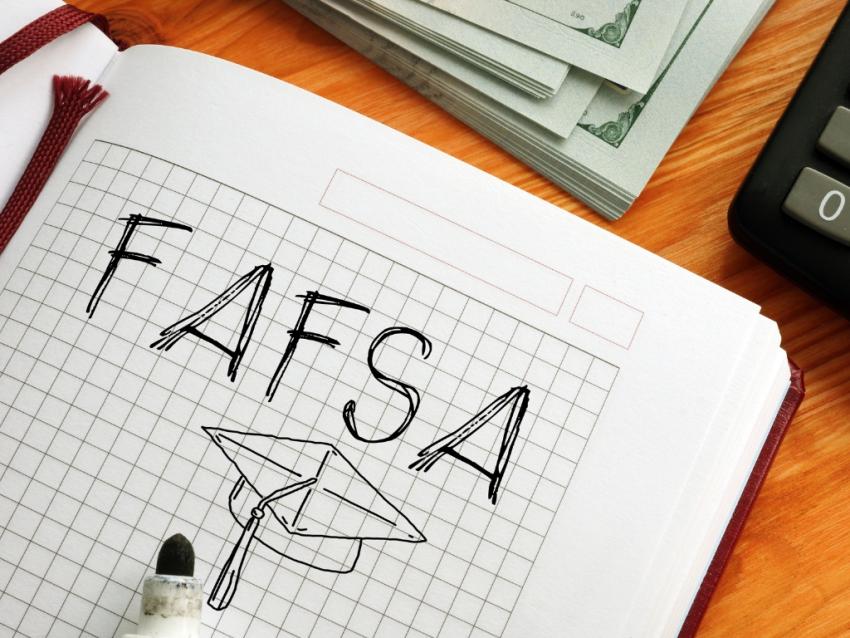VSAC transferred the servicing of your Federal Student loans to American Education Services and the guarantee of all VSAC Federal Student loans to the Trellis Company, an approved Federal Guaranty Agency, over the weekend of March 16th. CLICK HERE for more information.
On hold: Waiting on the FAFSA, waiting on student aid offers

If you’re planning on college or training after high school, this year’s FAFSA overhaul has reminded many of us that waiting can be frustrating.
The U.S. Department of Education’s Office of Federal Student Aid (FSA) updated their student financial aid (FAFSA) forms for the first time since Ronald Reagan was President. The rollout has not gone well for students, families, schools, or the FSA itself. But things are starting to look up. Here are some key takeaways:
- The FAFSA for the 2024-2025 school year launched in the final days of December, nearly three months past its usual October open date.
- Technical problems ran rampant, and then FSA announced it would update their Student Aid Index (SAI) to adjust for inflation, which further delayed FAFSA processing.
- Most recently, the FSA has reported that post-secondary schools and training programs will receive batches of comprehensive student financial aid data in mid- to late March.
Usually by spring, college financial aid packages are well in the hands of students and families. This year, colleges, training programs, and scholarship granting organizations don’t have the applicant and student data they need from FSA to put together financial aid offers. And students and families don’t have all the information they need from schools to make decisions.
When your education is on hold, and you are unable to reconcile your plans, it’s natural to feel anxious or uncertain about what comes next.
So, while that “on hold” music plays on (and on), what is the best thing to do now?
Fill out the FAFSA and Vermont Grant Application
If you're just getting started on your FAFSA, it’s important to file now. Even if you don’t think you’re eligible for federal student aid, or you're not sure what your next steps are, there are many reasons to file the FAFSA.
- Schools often use the FAFSA to determine institutional aid, which are privately funded packages offered by colleges or training programs.
- If your financial situation changes while you are in school, your financial aid office will request your FAFSA records as a baseline to estimate the change.
- Filling out the FAFSA opens access to federal student loans, if borrowing money is necessary to pursue your education goals.
- You never know, and every situation is different. Every year millions of dollars in student aid is left on the table. It’s worth a try!
For Vermont students, there is another important reason to file the FAFSA: the FAFSA is required to determine Vermont Grant eligibility. The Vermont Grant is based on a family’s financial need and is administered by VSAC on behalf of the State of Vermont. You apply for the Vermont Grant now and it will be matched to your FAFSA information once VSAC receives your FAFSA data. You will receive an email from VSAC if we need additional information.
VSAC will continue to process Vermont Grant applications and be ready to incorporate your FAFSA information (and consider it on time) when we receive it from FSA. Rest assured, VSAC will be monitoring the information FSA provides and we will adjust our grant process accordingly. VSAC will not allow FSA’s data processing delays to jeopardize your Vermont Grant eligibility.
Start your FAFSA application now
Ready, set … keep checking!
If you have already submitted your FAFSA and it is complete, or you are waiting to make changes, log in to your studentaid.gov account to check if your application has been processed. (Although FSA has said that they will send you an email when your application has been processed, we have worked with students and families whose applications have been processed who did not receive an email from FSA—so it’s best to log in to your account directly.).
If your application has been processed:
- View your submission summary to review your responses and check your eligibility information.
- If you need to make changes to your FAFSA, prepare to make them as soon as the form allows. FSA has said that once applications are processed, they “expect online corrections to be available in the coming weeks.” Make sure you keep checking your account, as this is a dynamic situation: you may not be able to make changes right away and the processing of your changes by FSA may also be delayed after you enter them.
- It’s probably been a while since you filed your FAFSA—make additions to your school lists as soon as you can. This way you can be sure that the schools to which you recently decided to apply receive your financial information.
In previous years, students and families could make changes well before schools and granting organizations used the FAFSA information to put together student financial aid packages: this is no longer the case. The timeline has been compressed this year, so it is critical that you keep checking your studentaid.gov dashboard and make any changes as soon as possible once you log in to your studentaid.gov account and see that the form allows changes to be made.
Prepare to Compare Your Offers
Once you do receive financial aid news from your schools, it’s likely you’ll have less time than in routine years to examine the financial implications of your education choices and commit to your next steps.
Prepare to compare your offers so you have all the information you need to analyze the implications of each financial aid package on you, your family, your finances, and your time at school:
- Reconsider the array of schools and programs to which you’ve been admitted: has anything changed since you submitted your school applications in terms of program, location, size, cost, or more?
- Assess your resources and determine what you could pay or borrow as you wait to hear if your aid will make up the difference. This is a great time for you and your family to have meaningful discussions about how much money the family will need, and how much money you and parents or guardians together will have toward college costs.
- To get ready to start comparing offers from schools, research the Cost of Attendance at each school, including tuition, fees, meals, books, supplies, transportation, and any other costs you think may surface. That way, when your financial aid offers arrive, you won’t be starting from scratch in your analysis.
- Organize your research with VSAC’s Financial Aid Offer Comparison. To help you interpret those financial aid offers (and take some of the stress out of the process), we’ve broken it down for you so you can better compare all your options and make informed choices.
- If your financial situation has substantially changed since you filed your FAFSA for the 2024-2025 school year, you may want to communicate your possible FAFSA changes with your school’s financial aid office now. Although it is an extraordinarily busy time for schools, FAFSA changes can prompt colleges to require follow-up, especially in scenarios of increased aid eligibility. If you are able to discuss your situation with a school financial aid officer, it will be helpful to know in advance what you might need to provide to the school to justify changes in your aid.
- If you anticipate that you may want to appeal a school’s ’s offer, visit VSAC’s Appealing Your Financial Aid page. You will find FAQs, a link to a webinar on appeals, a link to appeal letter templates, and more. You can start to draft a letter and fill in what is left after you receive your financial aid offer.
- May 1st is the typical deadline to commit to an institution on a traditional admissions cycle. Some schools have said they can be flexible, and a handful of colleges have announced extensions so far but we expect that list to grow. Your best bet is to check the website of each institution you’ve applied to and see if May 1 is still “Decision Day.” The National Association for College Admissions Counseling has a running list of colleges and universities that have changed their enrollment deadlines and financial aid priority dates for students planning to enroll in the fall of 2024.
VSAC Is Here to Help
Our financial aid counselors are also available for one-on-one FAFSA filing help—either in-person at our Resource Center in Winooski, or virtually from the comfort of your computer—from now through April. These sessions are offered free of charge, so don’t hesitate to make an appointment! Visit the VSAC calendar to sign up. Or, for quick FAFSA questions, call VSAC's toll-free FAFSA helpline at 833-802-8722 (Monday-Friday, 8:00am-4:30pm).
This year has been a challenge in student financial aid. This article was published on March 21, 2024, and FSA’s challenges with FAFSA data and processing remains a dynamic situation. But if there’s one silver lining to the great, gray, FAFSA cloud, it’s that everyone is in the same situation. Students, families, schools, and granting organizations across the country are all doing the best they can in the face of uncertainty, and VSAC is here to assist you. You’ve got this!





